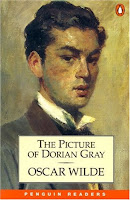 "The only way to get rid of a temptation is to yield to it. Resist it, and your soul grows sick with longing for the things it has forbidden to itself..." (p. 33)
"The only way to get rid of a temptation is to yield to it. Resist it, and your soul grows sick with longing for the things it has forbidden to itself..." (p. 33)Sometimes, and only sometimes, it feels as if I am a walking joke finely crafted by the universe, perpetually caught in the punchline cycle. Quite frankly, I don't find the universe's joke all that funny, but that's when s/he smacks me upside the head and laughs even more about it.
That's when I scowl and run away to the bathroom.
I only mention this because I had one of those moments today at work, and all I could do was shyly thank everyone for their comments before retiring to the bathroom (where I legitimately had to pee) to shake my head in hilarious frustration.
As part of a project I have been very closely working on and quasi-managing, I was responsible for sending an email to all staff in the Canadian office once again reiterating some of the deeply important fundamentals of the new initiative, officially launching tomorrow. Not wanting to make this one of those boring, fuddy duddy, standard office emails, I flowered it up a little and added some creativity.
I asked my manager to peruse the email before I sent it, as I had told her I would, just to ensure I didn't forget any details - two hears are better than one! - and was only met by her warm, and fairly standard, "That is wonderful! Perfect!"
I always experience a strange hiccup before actually hitting the send button for staff wide emails. There's so much stress behind knowing that that many people will be receiving your email simultaneously. That's a whole other story and issue unto itself though.
Shortly after sending out the email, another one of the girl's in my department immediately commented on how much she enjoyed one of my added flair bits, and was once again welcomed with "I know! Isn't it great?" from my manager.
When I returned to my desk following lunch, one of the lady's who had been away in the morning was chatting with my boss, and interrupted herself to compliment me on my email, stating just how well written I was.
I smiled. I said thank you a number of times. I also cast my eyes downward and temporarily booked it out of that situation because it was as if my life long goals were smacking me in the face. They were wearing flashing Christmas lights and performing the Riverdance in front of me, posing the question, "Why?"
Quite honestly, it all broke my heart a little, because I know what I want to do, and I'm not doing it. Despite being good at my current job, it's not where my heart lies. But I suppose that's the common problem many people have - we all just eventually find ourselves stranded in a place we never thought we'd end up. We justify to ourselves that our jobs are okay, pay well, and come with benefits. It's not what we want to do, but it's not the worst thing in the world.
It may be the common condition, but how many of us common condition folk are honest to goodness, deep down happy?
How many of us are yielding to our temptations like Dorian Gray? How many of us are ignoring them, allowing them to consume our souls?
Our portraits are all deformed, but unlike Dorian's, they're deformed for the wrong reasons.
"Words! Mere words! How terrible they were! How clear and vivid and cruel! One could not escape from them. And yet what a subtle magic there was in them! They seemed to be able to give plastic form to formless things, and to have a music of their own as sweet as that of viol or of lute. Mere words! Was there anything so real as words?" (p. 34)












